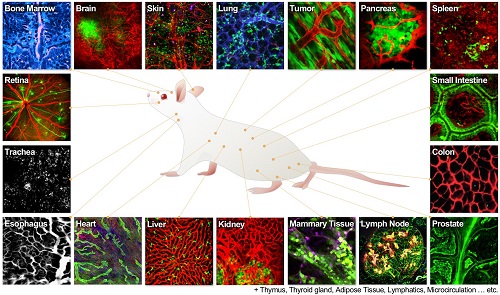A joint research project between IVIM Technology and a team led by Professor Pilhan Kim from the Graduate School of Nanoscience and Technology and Graduate School of Medical Science and Engineering has developed the biomicroscopes IVM-C and IVM-CM, which are the first that can observe biological processes inside a living organism.
IVM-C and IVM-CM are developed based on intravital microscopy (IVM), a form of microscopy that enables observation of distinguishable cells inside a live organism. IVM allows researchers to observe cells in a live organism over a set period of time. IVM is expected to become the next advanced imaging equipment for basic medical and biological studies to unveil complex biological processes of living organisms.
IVM-C and IVM-CM are the first complete three-dimensional bionic products to directly observe the cells that make up living internal tissue. Unlike traditional microscopic techniques that rely on multiple pieces of equipment, the new inventions are supported by high-speed scanning technology that enables the microscopes to process high resolution images in real time. The IVM-C model can acquire high-resolution focal images inside a living organism in four colors, while the IVM-CM model provides additional multi-photon videos.

With the growing demand for bionic microscopes in pharmaceutical fields, the new technology is anticipated to contribute to previously unachievable areas of research such as immunotherapy, cellular therapy, gene therapy and antibody drugs that work at the cellular level, unlike synthetic drugs.
The human body operates through complex interactions between countless cells. However, in the pre-construction phase of the new drug development process, such as in-vitro and in-vivo experiments, it was impossible for the researchers to conduct any interactive studies.
Further clinical trials in the pre-construction phase alone increase the likelihood of errors and failures. Efficacy analysis is crucial throughout the in-vivo experiments in living animals in the final stages before clinical trials for new drug development.
IVM technology can observe the movement of cells, proteins, and injected materials inside living animals simultaneously in three-dimensional high-resolution images that can significantly reduce time and cost of test results by minimizing the errors.
Professor Kim Pilhan commented, “IVM-C and IVM-CM will lead the way in developing the next generation of medical devices in a biometric environment by enabling single cell analysis.” IVM Technology received an investment of 3 billion KRW for its marketability and growth potential in September last year, just three months after the company was founded by In Seon Kim, the previous CFO of Genexine, a biotherapeutics company. The head researcher of the project is the current CTO of IVM Technology. The company seeks to solve difficulties in the field of biomedical research by providing next generation equipments.

